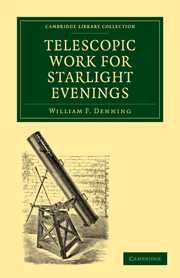Book contents
- Frontmatter
- PREFACE
- Contents
- ILLUSTRATIONS
- CHAPTER I THE TELESCOPE, ITS INVENTION AND THE DEVELOPMENT OF ITS POWERS
- CHAPTER II RELATIVE MERITS OF LARGE AND SMALL TELESCOPES
- CHAPTER III NOTES ON TELESCOPES AND THEIR ACCESSORIES
- CHAPTER IV NOTES ON TELESCOPIC WORK
- CHAPTER V THE SUN
- CHAPTER VI THE MOON
- CHAPTER VII MERCURY
- CHAPTER VIII VENUS
- CHAPTER IX MARS
- CHAPTER X THE PLANETOIDS
- CHAPTER XI JUPITER
- CHAPTER XII SATURN
- CHAPTER XIII URANUS AND NEPTUNE
- CHAPTER XIV COMETS AND COMET-SEEKING
- CHAPTER XV METEORS AND METEORIC OBSERVATIONS
- CHAPTER XVI THE STARS
- CHAPTER XVII NEBULÆ AND CLUSTERS OF STARS
- NOTES AND ADDITIONS
- INDEX
- Plate section
CHAPTER XIV - COMETS AND COMET-SEEKING
Published online by Cambridge University Press: 05 July 2011
- Frontmatter
- PREFACE
- Contents
- ILLUSTRATIONS
- CHAPTER I THE TELESCOPE, ITS INVENTION AND THE DEVELOPMENT OF ITS POWERS
- CHAPTER II RELATIVE MERITS OF LARGE AND SMALL TELESCOPES
- CHAPTER III NOTES ON TELESCOPES AND THEIR ACCESSORIES
- CHAPTER IV NOTES ON TELESCOPIC WORK
- CHAPTER V THE SUN
- CHAPTER VI THE MOON
- CHAPTER VII MERCURY
- CHAPTER VIII VENUS
- CHAPTER IX MARS
- CHAPTER X THE PLANETOIDS
- CHAPTER XI JUPITER
- CHAPTER XII SATURN
- CHAPTER XIII URANUS AND NEPTUNE
- CHAPTER XIV COMETS AND COMET-SEEKING
- CHAPTER XV METEORS AND METEORIC OBSERVATIONS
- CHAPTER XVI THE STARS
- CHAPTER XVII NEBULÆ AND CLUSTERS OF STARS
- NOTES AND ADDITIONS
- INDEX
- Plate section
Summary
Superstitious ideas with regard to comets as the harbingers of disaster have long since been discarded for more rational opinions. They are no longer looked upon as ill-omened presages of evil, or as
“From Saturnius sent,
To fright the nations with a dire portent.”
Many references are to be found among old writings to the supposed evil influence of these bodies, and to the dread which their appearance formerly incited in the popular mind. Shakespeare makes an allusion to the common belief :—
“Hung be the heavens with black, yield day to night!
Comets, importing change of time and states,
Brandish your crystal tresses in the sky;”
and in relation to the habit of connecting historical events with their apparition, he further says :—
“When beggars die, there are no comets seen;
The heavens themselves blaze forth the death of princes.”
But, happily, the notions prevalent in former times have been superseded by the more enlightened views naturally resulting from the acquirement and diffusion of knowledge; so that comets, though still surrounded by a good deal of mystery, are now regarded with considerable interest, and welcomed, not only as objects devoid of malevolent character, but as furnishing many useful materials for study. Mere superstition has been put aside as an impediment to real progress, and a more intelligent age has recognized the necessity of dealing only with facts and explaining them according to the laws of nature; for it is on facts, and their just interpretation, that all true searchers after knowledge must rely.
- Type
- Chapter
- Information
- Telescopic Work for Starlight Evenings , pp. 227 - 259Publisher: Cambridge University PressPrint publication year: 2010First published in: 1891

